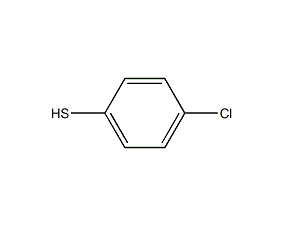4-Chlorothiophenol 4-Chlorothiophenol


Structural formula
| Business number | 02TS |
|---|---|
| Molecular formula | C6H5ClS |
| Molecular weight | 144.62 |
| label |
4-Chlorobenzene, 4-Chlorothiophenol, 4-Chlorothiophenol, 4-Chlorothiophenol, p-Chlorothiophenol, p-Chlorobenzenethiol, Chlorothiophenol, 4-Chlorothiophenol/4-Chlorobenzenethiol, 4-Cyano-Acetophonene/4-CA, 4-Chloro, 4-Chlorothiophenol 99%, 4-Chlorthiophenol, Para-Chlorothiophenol, Benzenethiol,Para-Chloro-, 4-Chlorothiopenol |
Numbering system
CAS number:106-54-7
MDL number:MFCD00004847
EINECS number:203-408-9
RTECS number:DC1050000
BRN number:605971
PubChem ID:None
Physical property data
1. Character: white crystal with pungent odor.
2. Density (g/mL, 25℃): Undetermined
3. Relative vapor density (g/mL, air=1): Undetermined
4. Melting point (ºC): 49-51
5. Boiling point (ºC, normal pressure): 205-207
6. Boiling point (ºC, kPa): Undetermined
7. Refractive index (D20): Undetermined
8. Flash point (ºC): 81
p>
9. Specific rotation (ºC): Undetermined
10. Autoignition point or ignition temperature (ºC): Undetermined
11. Vapor pressure (mmHg , 25ºC): Undetermined
12. Saturated vapor pressure (kPa, 25ºC): Undetermined
13. Heat of combustion (KJ/mol): Undetermined
14. Critical temperature (ºC): Undetermined
15. Critical pressure (KPa): Undetermined
16. Log value of oil-water (octanol/water) partition coefficient : Undetermined
17. Explosion upper limit (%, V/V): Undetermined
18. Explosion lower limit (%, V/V): Undetermined
19. Solubility: Insoluble in water, soluble in hot alcohol, ether and benzene.
Toxicological data
1. Skin/eye irritation
Standard Draize test: rabbit, skin contact: 20mg/24H, severity of reaction: moderate.
Standard Draize test: rabbit, eye contact: 50μg/24H, severity of reaction:serious.
2. Acute toxicity: Mouse intraperitoneal LD50: 75 mg/kg;
3. Chronic toxicity/carcinogenicity
Mouse skin exposure to TDLo :8000mg/kg/20W-I;
Ecological data
This substance is harmful to the environment. Special attention should be paid to the pollution of water bodies and aquatic life.
Molecular structure data
1. Molar refractive index: 39.32
2. Molar volume (cm3/mol): 113.9
3. Isotonic specific volume (90.2K ): 291.6
4. Surface tension (dyne/cm): 42.8
5. Dielectric constant:
6. Dipole moment (10-24cm3):
7. Polarizability: 15.58
Compute chemical data
1. Reference value for hydrophobic parameter calculation (XlogP): None
2. Number of hydrogen bond donors: 1
3. Number of hydrogen bond acceptors: 1
4. Number of rotatable chemical bonds: 0
5. Number of tautomers: 2
6. Topological molecule polar surface area 1
7. Number of heavy atoms: 8
8. Surface charge: 0
9. Complexity: 66.9
10. Number of isotope atoms: 0
11. Determine the number of atomic stereocenters: 0
12. Uncertain number of atomic stereocenters: 0
13. Determine the number of chemical bond stereocenters: 0
14. Number of uncertain chemical bond stereocenters: 0
15. Number of covalent bond units: 1
Properties and stability
Avoid contact with strong oxidants and strong alkali.
Storage method
Stored in a cool, ventilated warehouse. Keep away from fire and heat sources. Protect from direct sunlight. The packaging is sealed. They should be stored separately from oxidants, alkalis, and food chemicals, and avoid mixed storage. Equipped with the appropriate variety and quantity of fire equipment. Suitable materials should be available in the storage area to contain spills.
Synthesis method
Chlorobenzene is obtained by chlorosulfonation and reduction.
Purpose
Intermediates for pesticides and pharmaceuticals, also used in plasticizers, oil additives, and wetting agents.
